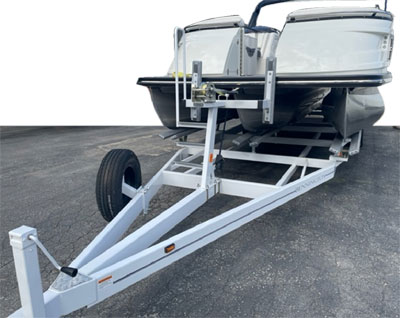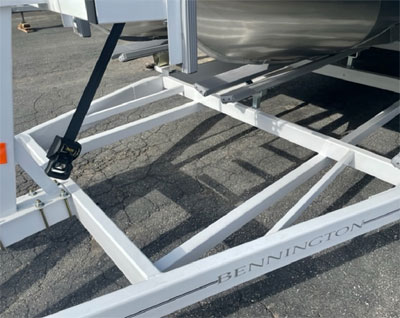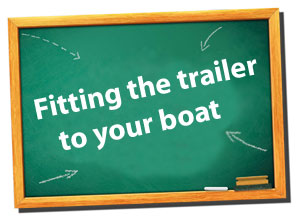 HOME |
|||||||||
Fitting Your Trailer to the Pontoon Boat |
|||||||||
|
When selecting a pontoon
trailer you must know the
length and approximate
weight of your pontoon. Length of the Pontoon Tubes Length should be easily determined and you will want a trailer about 4’ to 6’ longer than the pontoon tubes. For 20’ pontoons you’ll want a trailer with a 24’-26’ overall length. The reason you need a longer trailer is the swing radius at the front of the tubes. If you put a 20’ pontoon boat on a 20’ trailer, in a tight turn there won’t be enough trailer tongue, the front of the tubes could hit the back of the tow vehicle. |
|||||||||
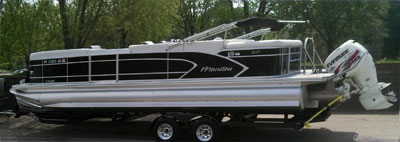 |
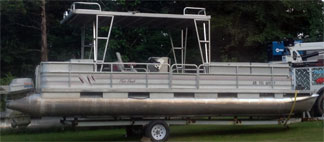 |
||||||||
| A Perfect Fit |
5 ' of overhang in the
stern. A big heavy pontoon on a single axle trailer |
||||||||
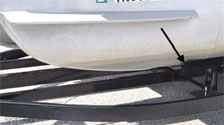 Bunk
length is not critical and
the overall length of bunks
varies by trailer
manufacturers. Most will
leave 3’-5’ of the front
nose cone unsupported. A
trailer for a 20’ pontoon
may have 15’-16’ bunks. The
nose cones on pontoons angle
up like the bow of a canoe
and cannot be supported. Bunk
length is not critical and
the overall length of bunks
varies by trailer
manufacturers. Most will
leave 3’-5’ of the front
nose cone unsupported. A
trailer for a 20’ pontoon
may have 15’-16’ bunks. The
nose cones on pontoons angle
up like the bow of a canoe
and cannot be supported. |
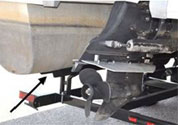 The stern should not have more than a couple of feet overhanging. |
||||||||
About fitting the boat to
the trailer. The
pontoon below is the deluxe
Bennington Q series on a
custom 6” frame trailer. The
owner didn’t scrimp on this
package. The trailer is
extremely well made and
braced, BUT the trailer is
8’-10’ too long for the
boat. It’s a triple axle so
weight distribution probably
isn’t a problem, but it
seems that the selling
dealer or the customer might
have noticed all the trailer
sticking out the front. When
traveling with a 27’ long
pontoon an extra 10’
sticking out the front just
seems wrong.
|
|||||||||
| The trailer above has a Bennington sticker on it, to match the boat. Bennington did not make the trailer the dealer added the sticker. If the owner needs warranty or parts when he calls Bennington he’ll find out they didn’t make the trailer. Hopefully the trailer manufacturers name will be on the original bill of sale. I’m not a “fan” of white trailers, they show dirt easily and sooner or later you’ll see small rust spots, but it does match the white fiberglass front of the pontoon and looks gorgeous at least when its new. | |||||||||
 Here’s another trailer that’s too long, it’s for a Quest 14’ pontoon that’s closer to 12’ long. The boat is on a trailer designed to fit a 14’-16’ pontoon. The customer probably ordered a 14’ trailer only to discover his boat was shorter. On a small boat like this having a bit of extra trailer in the front can make launching easier. Because the boat is lightweight, balance won’t be a problem |
|||||||||
| What is the weight of your pontoon? (including the engine) Boat weight can sometimes be difficult to determine. The manufacturer usually gives a weight in the sales brochure but it’s often without the engine. You can usually make an estimated guess. Most modern 20’ pontoons with full furniture will weigh 1800 to 2000 lbs. Engines can be 200 to 600 lbs. The reason you’re trying to determine the weight is to make the decision for a single (two tires) or tandem axle (four tires) pontoon trailer. Many single axle trailers only have a capacity of 2000 to 2200 lbs. For storage purposes an overloaded trailer might work but if you are traveling you’ll want a trailer that will adequately carry the weight of your pontoon, fuel, and gear. | |||||||||
| A Couple of Other Considerations Will you be using the trailer primarily as a storage trailer? Will your marina be picking up your boat and storing it on your trailer or will you be pulling your own boat and traveling with it? You can sometimes save money on a storage trailer: single axle versus tandem, no brakes, bias ply tires, etc. If you’re towing with your family in the vehicle and traveling 50-100 miles you might want a tandem axle trailer with brakes, radial tires, etc. If you’re traveling, you must pay attention to the trailer you’re buying. Many sellers of pontoon trailers offer storage trailers without consideration of how you’ll use it. | |||||||||
| Single Axle Trailer Generally speaking four tires on the road are always better than two. Once you buy a single axle trailer it’s difficult to add an axle. You can buy kits to add an extra axle, but you also need to change the fender and sometimes the way the additional axle will attach to the frame. If in doubt, buy the tandem axle to begin with. You’ll never be sorry to have four tires on the ground. | |||||||||
| Brakes or No Brakes Brakes add about $500 to the cost of a pontoon trailer but they should be considered. Particularly if you have a smaller tow vehicle or a large, heavy pontoon. A 3/4 ton pick-up may have enough extra braking capacity to stop a 1500-2000 lb. trailer. A mid size SUV probably doesn’t have enough additional braking capacity to stop a 2000 lb. load. Being able to avoid getting pushed into an intersection by your pontoon boat in a quick stop might be worth $500. | |||||||||
| Triple Tube Pontoon Boats I go into depth elsewhere about the special needs of triple tube pontoon boats. The important consideration for fitting is the length of the center tube. The latest thing in triple tube pontoon design is having a center tube longer than the outside pontoons. | |||||||||
 The engine
usually extends beyond the
transom and you may have as
much as 5’-6’ of center tube
and transom extending beyond
the back of your trailer. If
you have such a pontoon, you
may need a longer trailer.
This is the type of thing
that can be overlooked on a
new boat purchase. When
picking up your new boat
walk around the boat on the
trailer. Before you tow it
off the dealer’s lot, make
sure it fits. If there is a
question get the salesman in
your tow vehicle and run the
boat and trailer down the
road a few miles. I cannot
overemphasize the lack of
knowledge about fitting
modern triple tube pontoons
among some marine industry
professionals. The engine
usually extends beyond the
transom and you may have as
much as 5’-6’ of center tube
and transom extending beyond
the back of your trailer. If
you have such a pontoon, you
may need a longer trailer.
This is the type of thing
that can be overlooked on a
new boat purchase. When
picking up your new boat
walk around the boat on the
trailer. Before you tow it
off the dealer’s lot, make
sure it fits. If there is a
question get the salesman in
your tow vehicle and run the
boat and trailer down the
road a few miles. I cannot
overemphasize the lack of
knowledge about fitting
modern triple tube pontoons
among some marine industry
professionals. |
|||||||||
| HOME | |||||||||
| PONTOON TRAILERS 101 - FOR EVERYTHING YOU NEED TO KNOW ABOUT PONTOON BOAT TRAILERS | |||||||||

